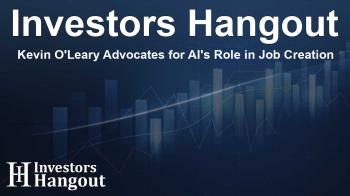Kevin O'Leary Advocates for AI's Role in Job Creation

Kevin O'Leary's Take on Artificial Intelligence and Employment
Recently, Kevin O'Leary, the renowned investor from 'Shark Tank', expressed his perspective regarding artificial intelligence (AI) and its impact on the job market. Contrary to widespread fears, O'Leary argues that AI is not a job destroyer but a catalyst for creating better job opportunities. His message resonates particularly during a time when many are concerned about the implications of AI for entry-level positions.
AI's Role in Enhancing Productivity
In a video shared on social media, O'Leary declared, "AI isn't destroying jobs, it's creating better ones." He highlighted that over 50 of his companies have incorporated AI into their operations, leading to significant cost reductions and productivity improvements. For instance, his watch insurance business can now issue policies in just nine seconds, showcasing the speed and efficiency that AI can bring to business processes.
Freeing Up Human Potential
O'Leary emphasized that AI can take over repetitive and monotonous tasks, thereby allowing workers to focus on more complex and fruitful careers. He stated, "If AI can flip burgers, that's a good thing. It leaves people free to explore and educate themselves into higher levels of job creation." This perspective positions AI not as a threat but as a tool that can empower individuals to seek better job opportunities.
Concerns About Entry-Level Employment
Despite O'Leary's optimistic view, a recent study from Stanford University paints a more nuanced picture of the job market's evolution in light of AI. It revealed a 13% decrease in hiring for entry-level positions, particularly affecting young workers aged 22–25 in tech-heavy industries. The decline signals that while technology can enhance productivity, it also disrupts traditional career paths for newcomers entering the workforce.
Changing Landscape for Young Professionals
According to the study, the hiring for young professionals dropped by 6% from the end of 2022 through mid-2025. Concurrently, older workers in fields less affected by automation experienced job growth, suggesting a shift in the types of employment opportunities available.
The Growing Divide in Employment Opportunities
Further emphasizing the challenges facing new graduates, reports from the New York Federal Reserve indicated that the unemployment rate for recent college graduates climbed to 4.8%, surpassing the national average. Surveys show that many employers, approximately 75%, plan to hire fewer entry-level candidates this year, with nearly half attributing this decision to the rise of AI technologies.
The Ongoing Debate Over AI's Impact
O'Leary's belief in AI's potential for productivity aligns with opinions expressed by leaders in the tech industry, such as the CTO of Palantir Technologies (NASDAQ: PLTR), Shyam Sankar, who noted that AI could increase worker productivity by up to 50 times. However, cautionary voices from executives like Jensen Huang of Nvidia Corporation (NASDAQ: NVDA) have raised alarms about the potential for AI to undermine entry-level jobs if innovation stalls. This discussion underscores the ongoing complexities surrounding the adoption of AI in the workforce.
Conclusion
Kevin O'Leary's insights into AI illustrate a belief that the technology can lead to enhanced job creation and productivity rather than serve as a mere replacement for human labor. However, the realities presented by recent studies concerning entry-level employment indicate the need for a balanced approach as industries continue to evolve with technological advancements.
Frequently Asked Questions
What is Kevin O'Leary's stance on AI and job creation?
Kevin O'Leary believes that AI enhances productivity and creates better job opportunities instead of destroying jobs.
How has AI affected entry-level hiring?
A Stanford study revealed a 13% decline in hiring for entry-level jobs, particularly impacting young workers in automated fields.
What are employers' plans regarding entry-level positions?
Around 75% of employers plan to hire the same or fewer entry-level workers, with many citing AI as a reason for this shift.
Which demographics are most affected by the rise of AI in the job market?
Younger workers, particularly those aged 22-25, have seen a significant drop in hiring prospects in AI-sensitive sectors.
What do industry experts think about AI's potential?
While some experts like O'Leary and Shyam Sankar celebrate AI's productivity, others caution about the risk of job displacement, particularly in entry-level roles.
About The Author
Contact Caleb Price privately here. Or send an email with ATTN: Caleb Price as the subject to contact@investorshangout.com.
About Investors Hangout
Investors Hangout is a leading online stock forum for financial discussion and learning, offering a wide range of free tools and resources. It draws in traders of all levels, who exchange market knowledge, investigate trading tactics, and keep an eye on industry developments in real time. Featuring financial articles, stock message boards, quotes, charts, company profiles, and live news updates. Through cooperative learning and a wealth of informational resources, it helps users from novices creating their first portfolios to experts honing their techniques. Join Investors Hangout today: https://investorshangout.com/
The content of this article is based on factual, publicly available information and does not represent legal, financial, or investment advice. Investors Hangout does not offer financial advice, and the author is not a licensed financial advisor. Consult a qualified advisor before making any financial or investment decisions based on this article. This article should not be considered advice to purchase, sell, or hold any securities or other investments. If any of the material provided here is inaccurate, please contact us for corrections.

